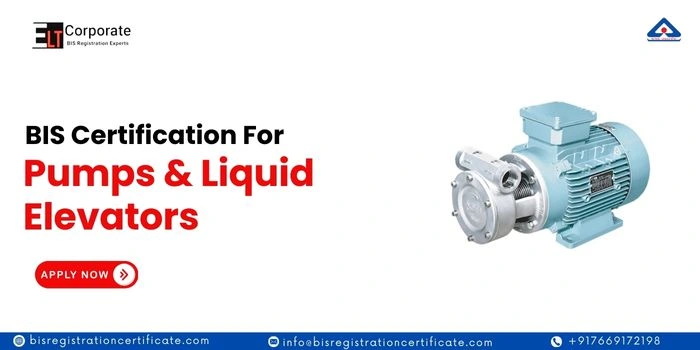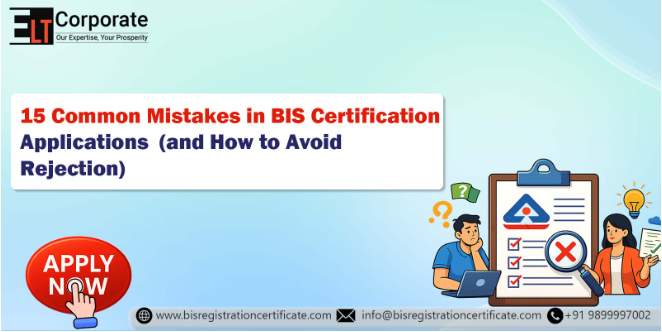Pumps and liquid elevators are vital industries like agriculture, manufacturing, and water management in India. To ensure these products are safe and reliable, the Government of India has made BIS certification mandatory. This certification assures compliance with strict quality and safety standards, protecting consumers and boosting market trust. For manufacturers and importers, BIS certificate is essential for legal market access and building a strong brand reputation. This blog covers everything you need to know about BIS certification for pumps and liquid elevators.
What Is BIS Certification?
The Bureau of India Standards is India’s national standards body, responsible for setting quality standards for products and services across multiple sectors. BIS certification is important for businesses that want to ensure that their products meet the quality, safety, and performance standards required by Indian law.
The certification process involves testing, inspecting, and certifying products to ensure they comply with the Indian Standards (IS) set by the BIS. This certification boosts consumer trust and helps businesses expand their market reach by proving their commitment to quality.
Read More: Introduction To Bureau Of Indian Standards
Importance of BIS Certification for Pumps & Liquid Elevators
Here’s a comprehensive explanation of the Importance of BIS Certification for Pumps & Liquid Elevators:
- Quality Assurance: A BIS certificate proves that the product meets national quality standards, ensuring the consumer’s safety and well-being.
- Legal Compliance: Many products in India are required by law to have BIS certification. Non-compliance could result in penalties or product recalls.
- Market Reputation: BIS certification increases a brand’s reputation, signalling to consumers that the product is reliable and high-quality.
- Export Facilitation: For businesses looking to export products. BIS certification is often a prerequisite for entering foreign markets.
- Consumer Trust: BIS-certified products are recognised and trusted by consumers, offering a significant competitive edge in the market.
Documents Required For BIS Certification For Pumps & Liquid Elevators
Here’s a list of mandatory documents required for BIS Certificate for Pumps & Liquid Elevators
- Filled CDF/CCL form
- Duly filled BIS application form
- Business License of manufacturing unit (English Translation + Local Language)
- The scope of business License (English Translation + Local Language)
- ISO certificate of the manufacturer
- Marking Label/Details of making on the products
- Authorisation letter (If signatory person is other than the head of the manufacturing)
- Trade Mark certificate
- Trademark Authorisation Letter (If ™ IS owned by someone other than the manufacturer)
- Authorisation Indian Representative Company registration proof in India
- Photo ID of Authorized Indian Representative/Authorized Signatory
- Technical Specification Sheet of the product/user manual
Read More: Documents Required For BIS Registration
Process To Get BIS Certification for Pumps & Liquid Elevators
Follow the steps mentioned below to get BIS certificate for Pumps & Liquid Elevators
- Submission of Application: An application for the license will not be accepted unless all compulsory fields are completed and the necessary documents and undertakings are uploaded. The applicant must also pay the application fee, factory inspection fee, and 50% of the minimum marking fee at the time of submission.
- Factory Inspection: On the day of the factory inspection, the manufacturer must have all required information, certifications and documents ready. The complete technical verification of the documents will be conducted during this visit.
- Sample Collection and Testing: The Inspection Officers must make sure the product sample is packed, sealed, and barcoded in their presence. A Photograph of the barcode will be transferred to the laboratory information management system (LIMS), which will suggest the best laboratory for testing. The inspecting Officers can accept this suggestion or choose another laboratory.
- Grants of License: The applicant must pay the remaining 50% of the minimum marking fee within seven days of the license grant. The ELT Corporate experts will manage the entire BIS Certification process during the grant phase.
- Renewal of Certification: BIS Registration is valid for 2 to 5 years. We help you in renewing it to ensure continued BIS compliance.
Read More: Process for getting BIS for Certification
Time Required to Obtain BIS Certification for Pumps & Liquid Elevators
Obtaining BIS certification for pumps and liquid elevators usually takes 4 to 6 months, and up to 6–7 months for foreign manufacturers. This includes document submission, product testing, factory audits, and final approval. Starting the process early is crucial to meet the compliance deadline and avoid delays.
Conclusion
BIS certificate for Pump & Liquid elevator is a critical step for manufacturers and importers aiming to succeed in the Indian markets. It is not just a regulatory tick-box but a comprehensive quality assurance mechanism that benefits businesses, consumers, and the industry at large. As the implementation date approaches, timely compliance will be key to unblocking new opportunities and building lasting trust in your products.
Is BIS Certification Mandatory For Imported Pumps?
Yes, if the pump category is under mandatory BIS certification, then importers must obtain BIS certification (ISI mark) before importing and selling such pumps in India.
Is BIS certification renewable?
Yes, BIS licenses are valid for 1–2 years and must be renewed before expiry. Renewal requires ongoing compliance and sometimes re-testing.
Can One BIS License Cover Multiple Pump Models?
Yes, if all models belong to the same ISI Standard and same manufacturing unit, they can be grouped under a single license subject to BIS approval.









